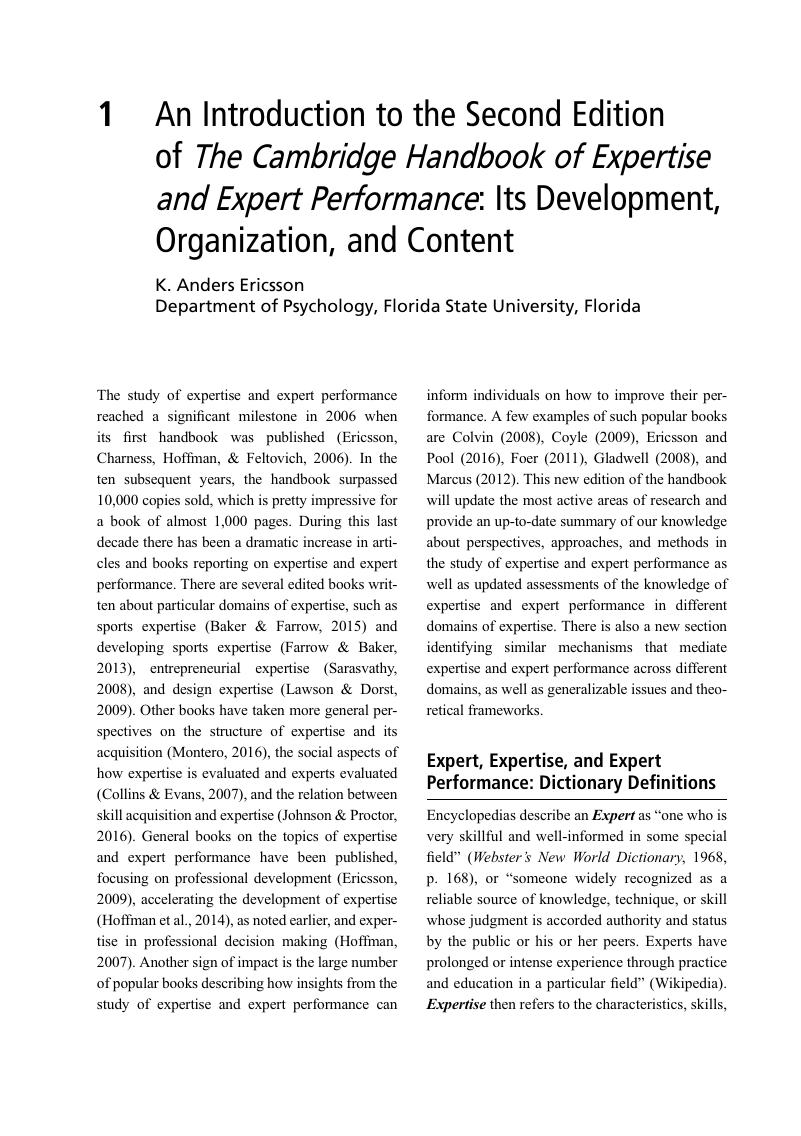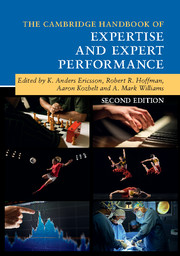Book contents
- The Cambridge Handbook of Expertise and Expert Performance
- The Cambridge Handbook of Expertise and Expert Performance
- Copyright page
- Contents
- Notes on Contributors
- Acknowledgments
- Part I Introduction and Perspectives
- 1 An Introduction to the Second Edition of The Cambridge Handbook of Expertise and Expert Performance: Its Development, Organization, and Content
- 2 A Sociological/Philosophical Perspective on Expertise: The Acquisition of Expertise through Socialization
- 3 Reframing Expertise and its Development: A Lifeworld Perspective
- 4 The Evolution of Expertise
- 5 Expertise in Other Animals: Canines as an Example
- Part II Overview of Approaches to the Study of Expertise: Brief Historical Accounts of Theories and Methods
- Part III Methods for Studying the Structure of Expertise
- Part IV Methods for Studying the Acquisition and Maintenance of Expertise
- Part V.I Domains of Expertise: Professions
- Part V.II Domains of Expertise: Arts, Sports, Games, and Other Skills
- Part VI Generalizable Mechanisms Mediating Types of Expertise
- Part VII General Issues and Theoretical Frameworks
- Index of Subjects
- References
1 - An Introduction to the Second Edition of The Cambridge Handbook of Expertise and Expert Performance: Its Development, Organization, and Content
from Part I - Introduction and Perspectives
Published online by Cambridge University Press: 10 May 2018
- The Cambridge Handbook of Expertise and Expert Performance
- The Cambridge Handbook of Expertise and Expert Performance
- Copyright page
- Contents
- Notes on Contributors
- Acknowledgments
- Part I Introduction and Perspectives
- 1 An Introduction to the Second Edition of The Cambridge Handbook of Expertise and Expert Performance: Its Development, Organization, and Content
- 2 A Sociological/Philosophical Perspective on Expertise: The Acquisition of Expertise through Socialization
- 3 Reframing Expertise and its Development: A Lifeworld Perspective
- 4 The Evolution of Expertise
- 5 Expertise in Other Animals: Canines as an Example
- Part II Overview of Approaches to the Study of Expertise: Brief Historical Accounts of Theories and Methods
- Part III Methods for Studying the Structure of Expertise
- Part IV Methods for Studying the Acquisition and Maintenance of Expertise
- Part V.I Domains of Expertise: Professions
- Part V.II Domains of Expertise: Arts, Sports, Games, and Other Skills
- Part VI Generalizable Mechanisms Mediating Types of Expertise
- Part VII General Issues and Theoretical Frameworks
- Index of Subjects
- References
Summary

- Type
- Chapter
- Information
- Publisher: Cambridge University PressPrint publication year: 2018
References
- 6
- Cited by



